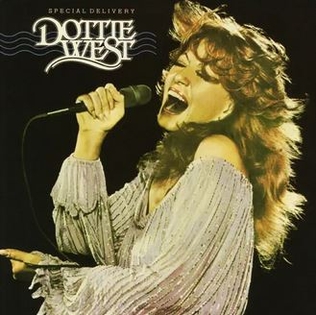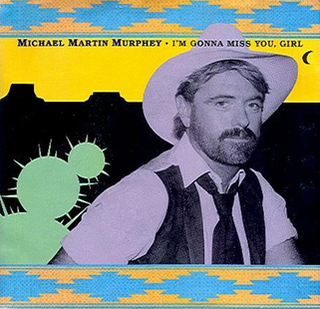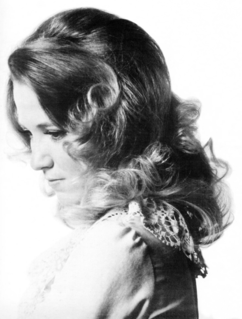
"Until You Come Back to Me " is a song written by Morris Broadnax, Clarence Paul, and Stevie Wonder. The song was originally recorded by Stevie Wonder in 1967, but his version was not released as a single and did not appear on an album until 1977's anthology Looking Back. The most well-known version of this song is the 1973 release by Aretha Franklin, who had a million-selling top 10 hit on Billboard charts. The song reached no. 1 on the R&B chart and no. 3 on the Hot 100 chart in 1974. It became an RIAA gold record.
"A Lesson in Leavin'", also titled as "Lesson in Leavin'"', is a song written by Randy Goodrum and Brent Maher. It was originally recorded in 1980 by American country music singer, Dottie West, who brought the song to No. 1 on the Billboard Country Chart. In 1999, it was re-recorded by American country music singer, Jo Dee Messina, whose version spent seven weeks at No. 2 on the Billboard Country Chart.
Alabama is a country music band composed of Randy Owen, Jeff Cook, Teddy Gentry, and Mark Herndon. Its discography comprises 26 studio albums, including 20 recorded for RCA Records. Alabama also charted 77 songs on the Billboard Hot Country Songs charts, of which 34 reached number one. The band's longest-lasting number one was "Jukebox in My Mind", which spent four weeks at that position in 1990. Several of the band's early-1980s releases also crossed over to the Billboard Hot 100 and Hot Adult Contemporary Tracks charts, including "Love in the First Degree", "Take Me Down", and "The Closer You Get", all of which reached top 40 on the Billboard Hot 100.

Wild West is a country album by Dottie West, released in 1981.

Special Delivery is the twenty second solo studio album by American country artist, Dottie West. The album was released in 1979 on Liberty Records and was produced by Randy Goodrum and Brent Maher. The album came on the heels of two chart-topping West duet albums with Kenny Rogers and reestablished West as a major solo artist, becoming West's most successful solo album since 1967 thanks in part to three top 15 country hits on the collection, including "A Lesson in Leavin'", the first solo number one record in West's 20-year career.

"Last Time I Saw Him" is the title of a 1973 single release by Diana Ross, being a composition by Michael Masser and lyricist Pam Sawyer: the track was produced by Masser and released in December 1973 at the same time as Ross' Last Time I Saw Him album.

Lee Greenwood is an American country music singer. His discography includes twenty-two studio albums, seven compilation albums and thirty-eight singles. Of his singles, seven have reached Number One on the Billboard Hot Country Songs charts: "Somebody's Gonna Love You" and "Going, Going Gone" from 1983, "Dixie Road" and "I Don't Mind the Thorns " from 1985, "Don't Underestimate My Love for You", "Hearts Aren't Made to Break " and "Morning Ride" from 1986. Thirteen more of his singles have reached Top 10 on the same chart, including "To Me", a duet with Barbara Mandrell from their duet album Meant for Each Other.

"This One's Gonna Hurt You " is a song written by American country music artist Marty Stuart, who recorded the song as a duet with Travis Tritt. It was released in June 1992 as the first single from Stuart's album This One's Gonna Hurt You. It peaked at #7 in the United States, and #6 Canada.

"What Am I Gonna Do About You" is a song written by Jim Allison, Doug Gilmore, and Bob Simon. It was first recorded by American country music artist Con Hunley in 1986 on the Capitol Records label and later by Reba McEntire for her 1986 studio album of the same name. Produced by Jimmy Bowen and McEntire, it was a number one single on the Billboard Magazine country music chart.
"Till I Can't Take It Anymore" is a song written by Clyde Otis and Ulysses Burton. It was first recorded by Ben E King in 1968. The song was featured in The Soul Clan self-titled album "The Soul Clan". Dottie West and Don Gibson version charted at 46 on the Hot Country Songs in 1970. Since then, it has also charted as a single by Andra Willis, whose version went to number 85 on the same chart in 1973. Pal Rakes's version went to number 31 in 1977.

"Sweet Music Man" is a song written and recorded by American musician Kenny Rogers. It appears on his 1977 album Daytime Friends, from which it was released as the final single.
"Rings of Gold" is a single by American country music artists Dottie West and Don Gibson. Released in February 1969, it was the first single from their album Dottie and Don. The song peaked at number 2 on the Billboard Hot Country Singles chart. It also reached number 1 on the RPM Country Tracks chart in Canada.

"I'm Gonna Miss You, Girl" is a song written by Jesse Winchester, and recorded by American country music artist Michael Martin Murphey. It was released in October 1987 as the lead single from the album River of Time. The song peaked at number 3 on the U.S. Billboard Hot Country Singles chart and at number 4 on the Canadian RPM Country Tracks chart.

The singles discography of American country singer Tanya Tucker consists of 85 singles. Tucker has charted 15 No. 1 Singles.

The singles discography of American country artist Dottie West contains 71 singles, 12 collaborative singles, 3 promotional singles and 1 other charting song. West signed with RCA Victor Records in 1963, having her first Top 40 hit the same year. It was followed in 1964 by "Love Is No Excuse", a duet with Jim Reeves that became West's first top 10 hit. In 1964, she also released "Here Comes My Baby". The song reached number 10 on the Billboard Hot Country Singles chart and became the first song by a female country artist to win a Grammy award. From her 1966 album, West issued four singles, including the top 10 hits "Would You Hold It Against Me" and "What's Come Over My Baby". Over the next two years she had major hits with "Paper Mansions", "Like a Fool", "Country Girl", and "Reno". In 1969, West collaborated with Don Gibson on "Rings of Gold", which reached number 2 on the Billboard country chart. In 1973, she released a single version of a commercial jingle originally used by The Coca-Cola Company. Entitled "Country Sunshine", the song became West's biggest hit, reaching number 2 on the country songs chart and number 49 on the Billboard Hot 100. The song also nominated her for her eleventh Grammy. After releasing the top 10 hit "Last Time I Saw Him" (1974), West's chart hits declined and she was dropped from RCA in 1976.
"Country Girl" is a song co-written and recorded by the American country music artist Dottie West. It was released in March 1968 as the first single and title track from the album Country Girl. The song peaked at number 15 on the Billboard Hot Country Singles chart. In addition, "Country Girl" was West's first song to enter the Canadian RPM Country chart, reaching a peak of number 5. West wrote the song with Red Lane.
"Reno" is a song written by Ruby Allmond, and recorded by American country music artist Dottie West. It was released August 1968 as the first single from the album The Best of Dottie West. The song peaked at number 19 on the Billboard Hot Country Singles chart. In addition, "Reno" peaked at number 6 on the Canadian RPM Country chart.
"Come See Me and Come Lonely" is a song written by Red Lane, and recorded by American country music artist Dottie West. It was released in May 1978 as the first single from the album Dottie. The song peaked at number 17 on the Billboard Hot Country Singles chart. In addition, "Reno" peaked at number 28 on the Canadian RPM Country chart. Later in the year, the single was released onto West's 1978 album entitled Dottie. It was the only single released from the album.
"Anyone Who Isn't Me Tonight" is a song written by Julie Didier and Casey Kelly and recorded by American country music artists Kenny Rogers and Dottie West. It was released in August 1978 as the second single from the album Every Time Two Fools Collide. The song peaked at number 2 on the Billboard Hot Country Singles chart. The song also peaked at number 10 on the RPM Country Tracks chart that year.

The albums discography of American country artist Dottie West contains 32 studio albums and 17 compilation albums. Among West's studio releases were 4 collaborative albums with various artists, including Kenny Rogers. After signing with RCA Victor Records in 1963, West released her debut studio album Here Comes My Baby (1965). The album peaked at number 12 on the Billboard Top Country Albums chart in July of 1965. West's third studio album Suffer Time (1966) spawned four singles, including "Would You Hold It Against Me", a top 5 hit on the Billboard Hot Country Songs chart. Suffer Time would reach number 3 on the country albums chart, West's highest-charting solo album. Between 1967 and 1968, West released 5 more studio albums. With All My Heart and Soul (1967) featured the top 10 hit "Paper Mansions" and the album itself peaked at number 8 on the Top Country Albums list. In 1969, she paired with Don Gibson for her first collaborative project Dottie and Don. The album featured the pair's number 2 Billboard country hit "Rings of Gold". In 1970, she collaborated with Jimmy Dean on the studio release Country Boy and Country Girl. In 1973, West had her biggest hit with the single "Country Sunshine". Its corresponding album of the same name peaked at number 17 on the country album chart in February 1974.










